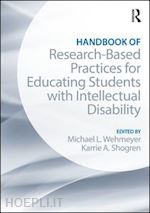Section I: Understanding Intellectual Disability Chapter 1 Historical Understandings of Intellectual Disability and the Emergence of Special Education Michael L. Wehmeyer, J. David Smith Chapter 2 Reframing Educational Supports for Students with Intellectual Disability Through Strengths-Based Approaches Karrie A. Shogren, Michael L. Wehmeyer, Robert L. Schalock, James R. Thompson Chapter 3 Supports and Support Needs in Strengths-Based Models of Intellectual Disability James R. Thompson, Karrie A. Shogren, Michael L. Wehmeyer Chapter 4 Implications of Strengths-Based Models of Disability for the Education of Students with Intellectual Disability Michael L. Wehmeyer, Karrie A. Shogren Section II: Eligibility, Assessment, and Educational Planning Chapter 5 Measuring Intellectual Functioning and Adaptive Behavior in Determining Intellectual Disability Marc J. Tassé, Margaret H. Mehling Chapter 6 Measuring Support Needs and Supports Planning James R. Thompson, Carolyn Hughes, Virginia Walker, Stephanie DeSpain Chapter 7 Alternate Assessment Meagan Karvonen, Shawnee Wakeman, Neal Kingston Chapter 8 Individualized Education Programs to Promote Access to the General Education Curriculum for Students with Intellectual Disability Michael L. Wehmeyer, Suk-Hyang Lee Chapter 9 Planning for Other Educational Needs and Community-Based Instruction David W. Test, Fred Spooner, Debra Holzberg, Colleen Robertson, Luann Ley Davis Chapter 10 Transition Planning James E. Martin, Amber E. McConnell Chapter 11 Person-Centered and Student-Directed Planning Karrie A. Shogren, Michael L. Wehmeyer, James R. Thompson Section III: Schoolwide and Classroomwide Academic and Behavioral Supports Chapter 12 Multi-Tiered Systems of Supports Karrie A. Shogren, Michael L. Wehmeyer, Kathleen Lynne Lane, Carol Quirk Chapter 13 Positive Behavior Supports for Students with Intellectual Disability Glen Dunlap, Donald Jackson, Ashley Greenwald Chapter 14 The Role of Technology in Implementing Universal Design for Learning Loui Lord Nelson, Mindy Johnson Chapter 15 Supporting the Social Lives of Students with Intellectual Disability Elizabeth E. Biggs, Erik W. Carter Chapter 16 Self-Determination and Goal Attainment Karrie A. Shogren, Michael L. Wehmeyer Chapter 17 Educating Students in Inclusive Classrooms Jennifer Kurth, Susan Marks, Jody Bartz Chapter 18 Research-based Practices for Fostering Trusting Partnerships with Families in Educating Students with Intellectual Disability Kathleen Kyzar, Shana J. Haines, Ann P. Turnbull, Jean Ann Summers Chapter 19 Teaching Reading and Literacy Skills to Students with Intellectual Disability Susan R. Copeland, Elizabeth B. Keefe Chapter 20 Teaching Mathematics and Science to Students with Intellectual Disability Alicia Saunders, Diane Browder, Jenny Root Section IV: Education across the Lifespan Chapter 21 Early Intervention and Early Childhood Education Michaelene M. Ostrosky, Rosa Milagros Santos, Hasan Y. Zaghlawan Chapter 22 High Quality Educational Programs for Students with Intellectual Disability in Elementary School Kendra Williams-Diehm, Susan B. Palmer Chapter 23 High Quality Educational Programs for Students with Intellectual Disability in Middle and Junior High School Colleen A. Thoma, Kimberly Wolowiec Fisher, Sarah Hall, LaRon A. Scott, Irina Cain, Andrew Wojcik, Brittany Sterret Chapter 24 High Quality Educational Programs for Students with Intellectual Disability in High School Mary E. Morningstar, Jennifer Kurth, Michael L. Wehmeyer, Karrie A. Shogren Chapter 25 Transition to Employment Paul Wehman, Lauren Avellone, Valerie Brooke, Pam Hinterlong, Katherine Inge, Stephanie Lau, Jennifer McDonough, Grant Revell, Carol Schall Chapter 26 Postsecondary Education for Students with Intellectual Disability Meg Grigal, Maria Paiewonsky, Debra Hart About the Editors About the Contributors Index











